Teenagers are the fastest-growing demographic of caffeine drinkers, with over 80% of them drinking caffeinated beverages on a regular basis.
Many reasons contribute to the rising number of teenagers who use caffeine to meet their daily energy needs, including scholastic expectations, athletics, poor sleep management, and recreational activities.
While many young individuals are unaware of the hazards of high caffeine use at such a young age, their parents may have concerns about allowing their children to do so.
The way I look at it, the best low-caffeine drinks are AMP Zero Sugar, Game Fuel Zero Sugar, Aspire, and Red Bull Sugar-Free. For those that are 100% caffeine-free, I’d recommend Bang-Caffeine Free, and XS Energy.
You may jump to the list, but you can also read on to learn more about caffeine and teens, as well as the gray areas of caffeine regulation that few people are aware of or discuss.
Let’s get started…
Page Contents
Can Teens Drink Energy Drinks?
While caffeine is not beneficial for long-term health, it’s clear why more and more teenagers are turning to it for its energy-boosting effects as well as its potential to enhance alertness, focus, and response speed.
While caffeine isn’t known to be beneficial for long-term health, it’s clear why more and more teenagers are turning to it for its energy-boosting effects as well as its potential to enhance alertness, focus, and response speed.
Caffeine and energy drinks may be used recreationally by a huge number of teenagers, particularly if they are ardent video game players who spend long hours of the night battling strangers for virtual money on the internet.
How Sensitive Are Teenangers To Caffeine?
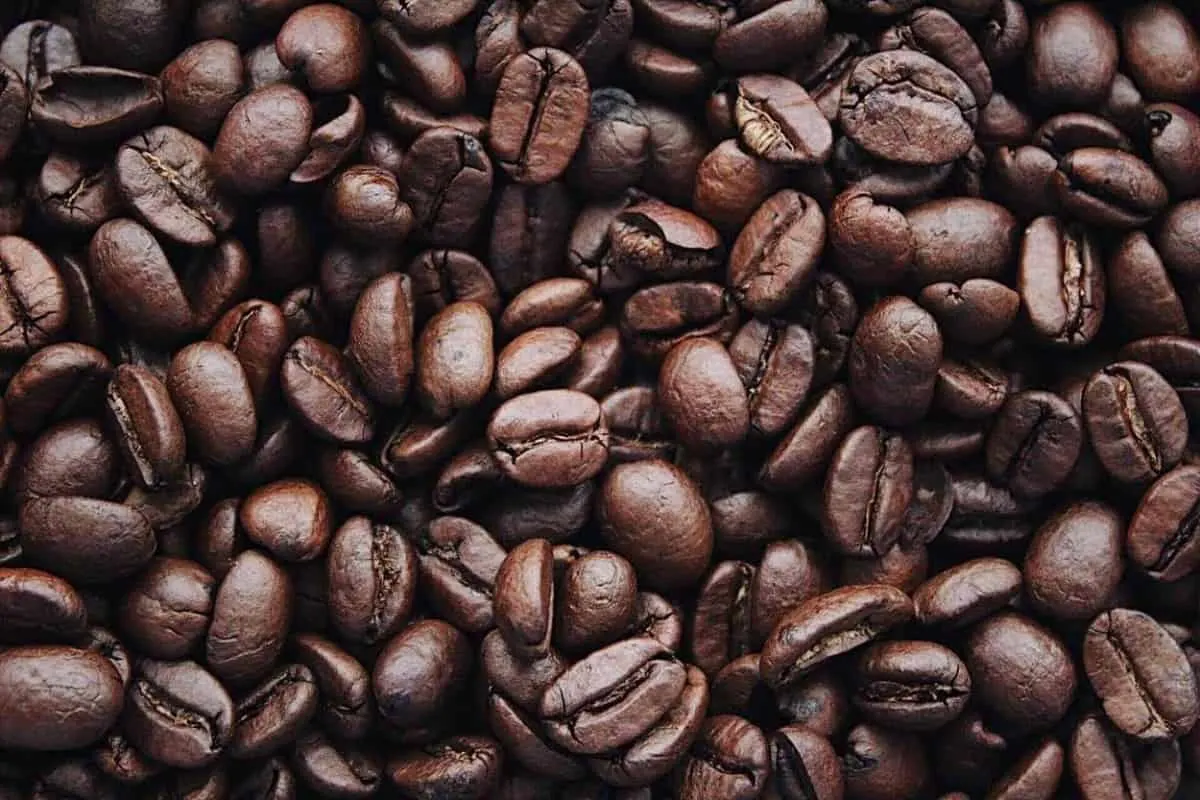
Teens are more sensitive to caffeine than adults.
This is because teens’ body mass is smaller than adults’. And also the majority of teens are relatively caffeine naive compared to adults.
A new study shows, energy drinks have an immediate impact on heart rhythm and can cause an increase in blood pressure. While most adults can tolerate this slight change in heart rate, it can be fatal for teens especially with heart problems.
The below-suggested brands are low in caffeine and below 100mg, recommended by the American Academic of Pediatrics.
Energy Drinks For Teens With Low Caffeine
| Brands | Caffeine | Sugar | Calories |
| Game Fuel Zero Sugar | 90mg | 23g | 90 |
| Red Bull Total Zero | 80mg | 0g | 0 |
| Red Bull Sugar-Free | 80mg | 0g | 5 |
| Aspire | 80mg | 0g | 0 |
| Bang Caffeine Free | 0mg | 0g | 0 |
| XS Energy | 80mg | 0g | 10 |
| Emerge Sugar-Free | 75mg | 0g | 2 |
Game Fuel Zero Sugar

A 16 fl. oz can of Game Fuel contains 90mg caffeine, 23g of sugar, and 90 calories.
Game Fuel is designed to provide you with an ultimate boost of energy as it has some powerful ingredients in it. Game Fuel has caffeine in combination with L-Theanine has been shown to improve accuracy and alertness.
It also has Yerba Mate, Panax Ginseng, Gum Arabic, and Vitamin A, which work together to help you perform better.
Game Fuel is also known for great taste and comes at a reasonable price. It’s also okay to consume this daily, as long as you stick to a single can a day.
Drinking more than one is discouraged due to its sugar content, which heightens the risk of type 2 diabetes and even tooth decay among others.
Red Bull Total Zero
Red Bull Total Zero is the classic Red Bull but without the added calories and sugar.
A single can of Red Bull Total Zero contains only 80mg of caffeine, vitamins, and amino acids present drink. The zero caloric nature along with the low caffeine of Red bull Total Zero is a great option for a teenager who wants energy.
If you want to know more about Red Bull and how it works, check out my review on Red Bull for my experience and thoughts on the drink.
Red Bull Sugar-Free
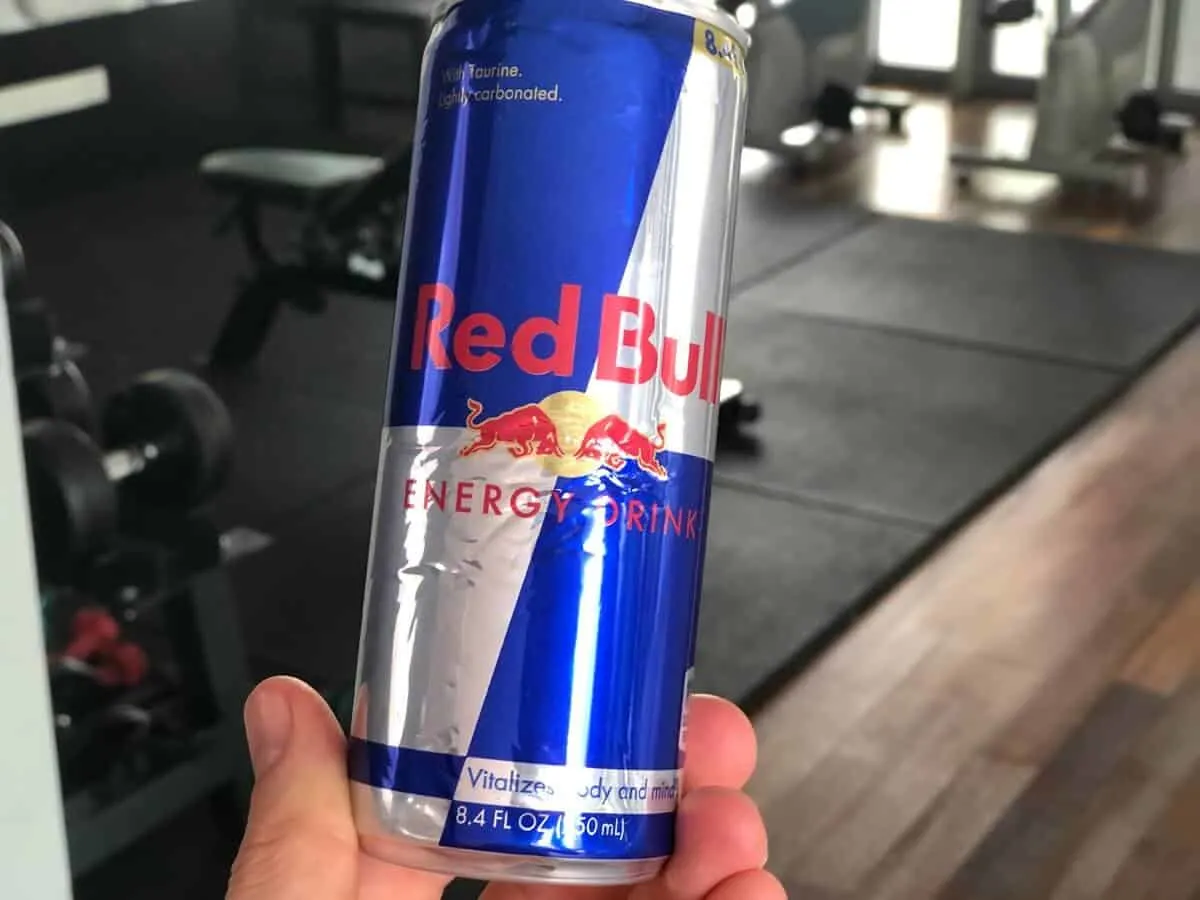
An 8.4 fl. oz Red Bull sugar-free is the sugar-free version of the classic Red Bull.
It has only 5 calories per serving and contains high-quality ingredients like Taurine, B group vitamins, and Alpine Water.
The caffeine content (80mg per serving) is in a moderate amount which will give you a pretty good boost of energy. This amount can be likened to having a cup of coffee, so really its the same in just a different flavor.
Aspire
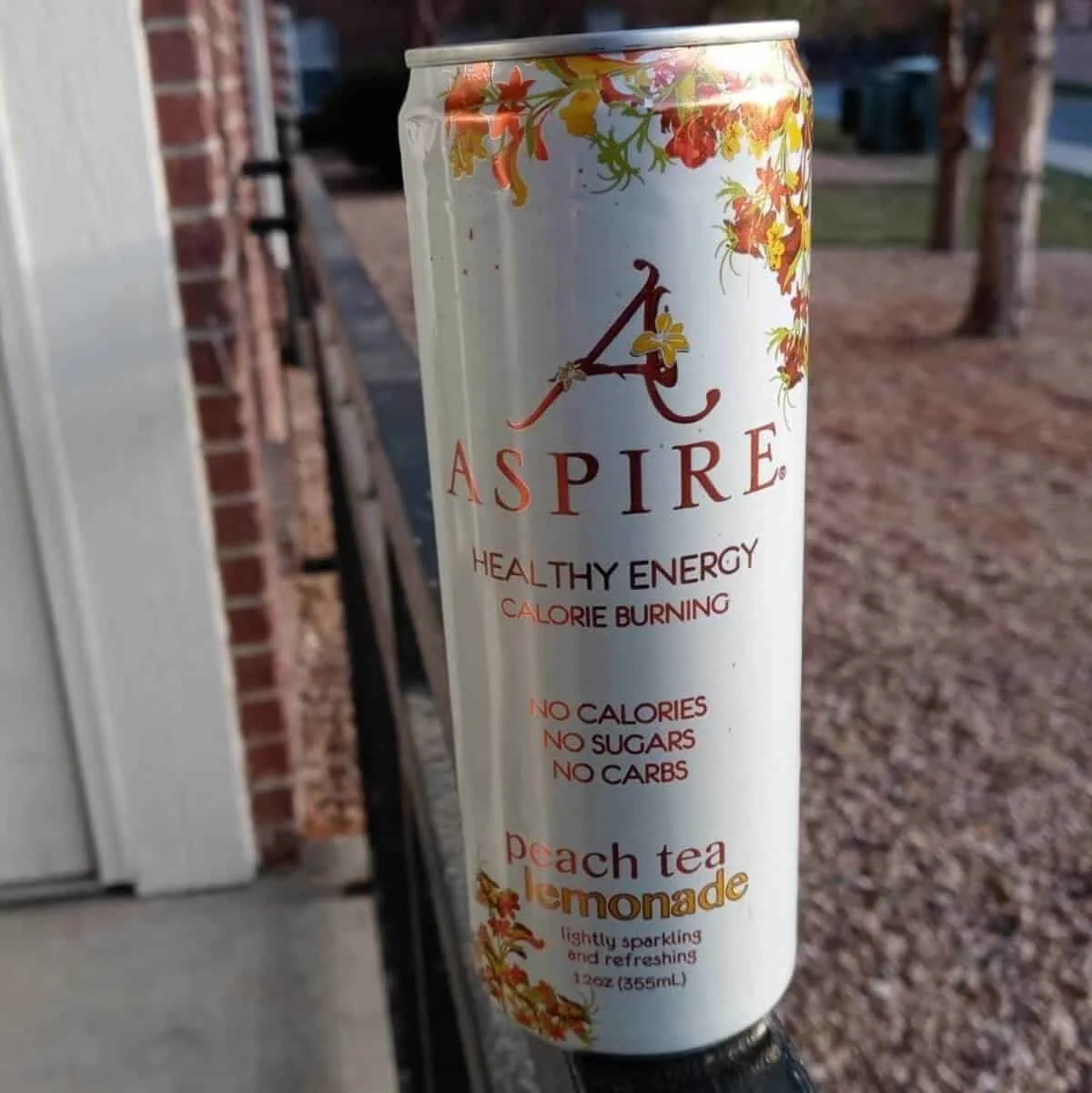
Aspire Energy drink contains 0g of sugar and 80mg of caffeine.
It has no calories as well which makes it suitable if you’re trying to lose weight or if you’re on a diet as a teenager. It comes with some plant-based ingredients which make it one of the healthiest energy drinks in the market.
It helps to enhance your cognitive abilities and mental alertness, which might come in handy for all-nighters in front of the screen or when you’re cramming.
Bang Caffeine Free
Bang caffeine-free energy drinks contain no caffeine, are sugar-free, and have no calories.
Caffeine-free Bang energy has all the goods except for caffeine.
Moreover, all the Bang energy drinks are sugar-free and carb-free.
Bang has essential amino acids, which help to build your muscle, to function your body properly, and to keep your body healthy.
The price of a 16 fl. oz can of Bang Energy is around $2 according to the Amazon website and a pack of 12 with a retail price of about $24.
XS Energy
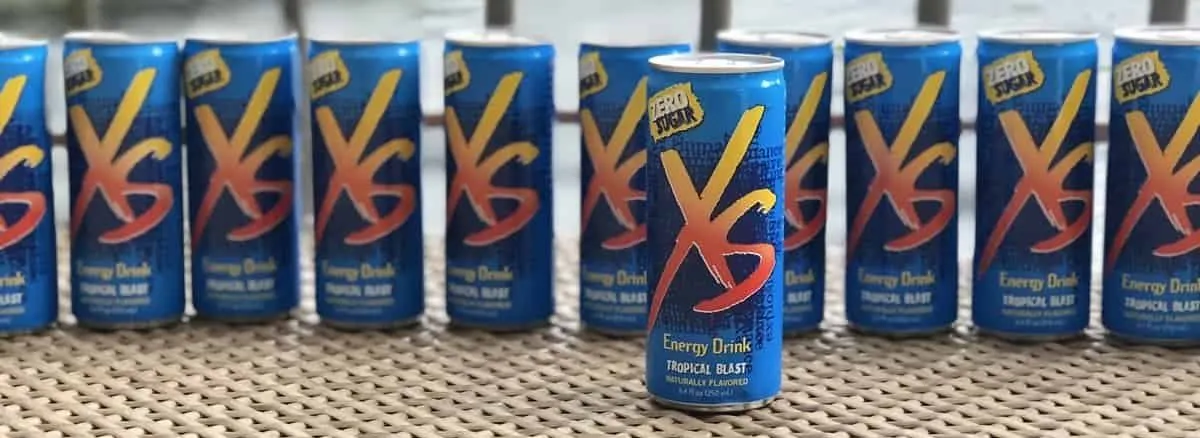
An 8.4 fl. oz can of Xs Energy has zero sugar, 80mg of caffeine, and 10 calories per serve.
It’s designed for a healthy, active lifestyle with premium ingredients, herbs, and B vitamins.
XS Energy contains natural flavors, which are delicious. Some of the flavors are caffeine-free which makes this brand suitable for teens.
Emerge Sugar Free
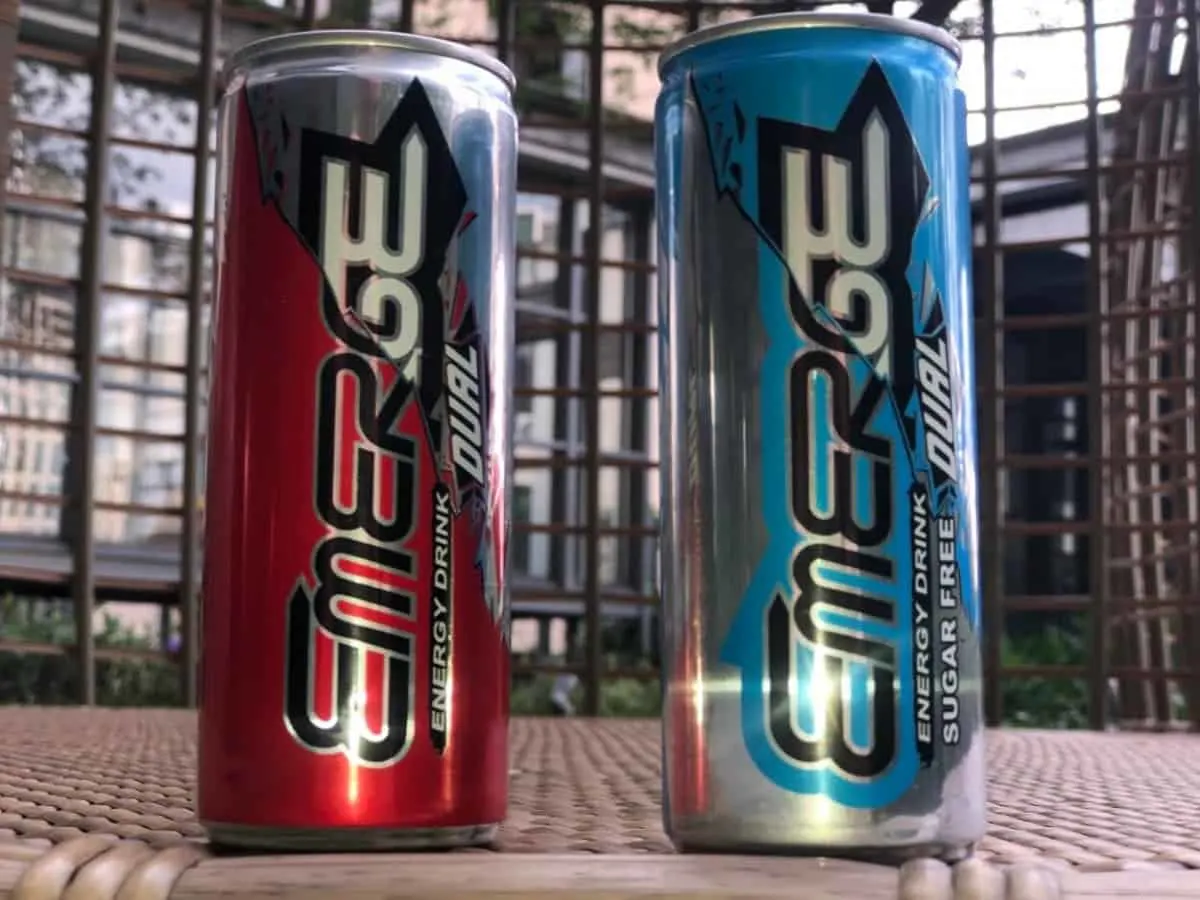
This is a popular energy drink from the UK. It’s a rich fruit-flavored carbonated drink with some amino acids and vitamins.
Emerge has a decent level of caffeine 75mg. It has a low calorie which is only 2 calories.
With the low amount of calories and low caffeine, it’s suited for teens.
Is It Advisable For Teens To Consume Energy Drinks?
While it’s not really bad for teens to drink energy drinks, it’s not advisable either.
According to the FDA, it’s recommended that an adult should not consume more than 400mg of caffeine in a day. If you consume close or more to the threshold limit, you may experience symptoms like:
- Restlessness
- Insomnia
- Anxiety
- Irritability
- Increase in body temperature
- Dehydration
- Headache
- Heart palpitations
However, there are no official guidelines by FDA about kids and caffeine. But, the American Academy Of Pediatrics discourages the consumption of caffeine or other stimulants by kids and adolescents.
Also, according to the American Academy of Pediatrics, if you’re between the age group of 12 to 18 years, you shouldn’t consume more than 100mg of caffeine per day.
Moreover, energy drinks have a high amount of sugar and there are also ingredients like B vitamins, Guarana, ginseng, green tea extracts, and Taurine. These components might not be safe for teens according to research done by the AHA.
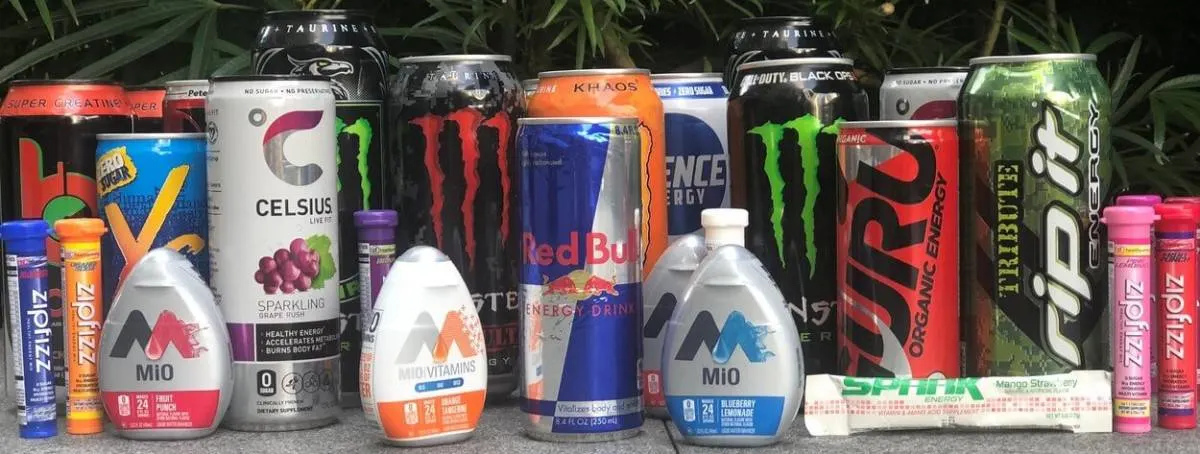
Do Energy Drinks Have An Age Limit?
There are no age limit restrictions for energy drink consumption.
Plus, it’s not illegal to sell energy drinks to individuals who are under 16 years old. Also, if you’re under 16 years, you don’t have to show any ID to buy energy drinks.
Moreover, there’s no legal limit on the amount of any caffeinated food or beverages that someone can buy in one transaction.
What Are The Effect Of Energy Drinks On Teens?
There are plenty of negative consequences if energy drinks are consumed by teens.
According to this research, teens between 13 to 19 years faced these side effects after consuming energy drinks:
- Insomnia
- Nausea
- Vomiting
- Jitterness
- Headache
- Abdominal pain
The National Institutes of Health states that consuming this high amount of energy drinks can disrupt sleeping patterns and might also increase risk-taking behavior.
How Does Sugar Affect Teens?

According to AHA, it’s recommended that children aged between 2 to 18 years should not consume more than 25g or 6 teaspoons of sugar per day.
In early childhood, consuming beverages high in sugar is linked to the development of heart disease and obesity.
The two most common types of sugar are Sucrose and high fructose corn syrup. These can cause a variety of health problems too:
- risk of fatty liver
- obesity and weight gain
- risk of diabetes
- risk of inflammation
If you’re a teen, you’re more likely to have these negative side effects. Hence, you should be careful when consuming excess sugar from any food or drink.
Check out the video below if you want to know more about sugar.
Are there any energy drinks that are safe for teenagers to consume?
There are no specific energy drinks for teenagers. While there are energy drinks marketed towards teenagers, it is important to remember that the American Academy of Pediatrics does not recommend energy drinks for children and adolescents due to their high caffeine content and potential negative health effects.
Instead of relying on energy drinks, teenagers can try alternative methods for getting energy such as drinking water, eating a healthy diet, and exercising regularly. If a teenager feels they must consume an energy drink, they should speak with their doctor first to understand the risks and benefits.
What is the best energy drink for teenagers?
There is no best energy drink for teenagers. It’s generally recommended for teenagers to avoid energy drinks altogether, as they can have negative health effects. However, if a teen does consume energy drinks, it’s important to choose a lower-caffeine option, such as XS Energy or Hi-Ball Energy.
Many health experts suggest that teens should avoid energy drinks altogether and instead opt for healthier alternatives like water or sports drinks. Energy drinks can cause health issues like increased heart rate, anxiety, and even addiction. It’s important to speak with a doctor before consuming energy drinks, especially for teenagers.
Is it OK for a 17 year old to drink energy drinks?
The consumption of energy drinks by teenagers, including 17-year-olds, is a topic of concern. While occasional consumption of energy drinks may not pose significant risks, it’s important to consider several factors before allowing a teenager to consume them regularly.
Energy drinks typically contain high levels of caffeine and other stimulants, which can affect young and developing bodies more strongly than those of adults. Excessive caffeine intake can lead to issues such as increased heart rate, high blood pressure, sleep disturbances, and even potential adverse effects on growth and development.
What age is OK to drink energy drinks?
Determining the appropriate age for consuming energy drinks is a matter of health and safety. Generally, it’s recommended that children and adolescents avoid or limit their consumption of energy drinks due to the potential risks associated with the high caffeine and sugar content.
Many health experts suggest that individuals under the age of 18 should avoid energy drinks altogether. The American Academy of Pediatrics recommends that children and adolescents avoid caffeine-containing beverages, including energy drinks. This is because their developing bodies can be more sensitive to the stimulant effects of caffeine.
Final thoughts
Teens are more at risk of health hazards related to caffeine than adults. There is a serious chance that teens can develop caffeine intoxication and caffeine withdrawal symptoms when consuming these energy drinks in high amounts.
Teens should be educated on the potential dangers of excess caffeine consumption. Also, a high amount of sugar and other ingredients present in energy drinks can cause serious harm too.
The bottom line is, teens should stay away from energy drinks until they become adults. However, if they wish to consume, they can consume low caffeinated energy drinks occasionally as mentioned in the list above.
Also, doing thorough research can become handy in choosing the right energy drink for you.
